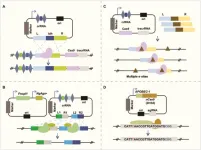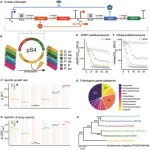(Press-News.org) Researchers at Sinai Health have unearthed vital information about the relationship between insulin levels after eating and long-term heart and metabolic health. The research upends the notion that insulin surge following food intake is a bad thing.
On the contrary – it could be an indicator of good health to come.
Led by Dr. Ravi Retnakaran, Clinician-Scientist at the Lunenfeld-Tanenbaum Research Institute, part of Sinai Health, the study set out to explore how insulin levels after meals impact cardiometabolic health. While past research has yielded conflicting results, suggesting both harmful and beneficial effects, this new study aimed to provide a clearer picture over an extended period of time.
The team reported their findings in the online journal eClinicalMedicine, published by the Lancet group.
Normally, insulin levels rise after eating to help manage blood sugar. However, the concern is whether a rapid increase in insulin after a meal could spell bad health. Some believe the insulin surge, especially after eating carbs, promotes weight gain and contributes to insulin resistance. This occurs when the body's cells don't respond well to insulin, making it harder to control blood sugar levels and increasing the risk of type 2 diabetes.
“The suggestion has been made by some people that those insulin peaks have deleterious effects by promoting weight gain,” said Dr. Retnakaran, who is also Endocrinologist at the Leadership Sinai Centre for Diabetes at Mount Sinai Hospital where he holds the Boehringer Ingelheim Chair in Beta-cell Preservation, Function and Regeneration. He is also a Professor at the University of Toronto’s Temerty Faculty of Medicine.
“Sometimes I see patients in the clinic who have adopted this notion, maybe from the internet or what they're reading, that they can't have their insulin level go too high,” he said.
The science is just not conclusive enough to support this notion. Most studies on this topic were either conducted over a short period of time or were based on insulin measurements in isolation that are inadequate and can be misleading, said Dr. Retnakaran.
His team sought to address this problem by looking at cardiometabolic implications of insulin response over the long term, and in a way that accounts for baseline blood sugar levels. The latter point is key because each person has an individual insulin response that varies depending on how much sugar is in the blood.
The study followed new mothers because the insulin resistance that occurs during pregnancy makes it possible to determine their future risk of type 2 diabetes. 306 participants were recruited during pregnancy, between 2003 and 2014, and underwent comprehensive cardiometabolic testing, including glucose challenge tests, at one, three, and five years after giving birth. The glucose challenge test measures glucose and insulin levels at varying time points after a person has had a sugary drink containing 75 grams of glucose and following a period of fasting.
While commonly used in medical practice, the interpretation of insulin levels from the test can be misleading if one does not account for baseline blood sugar. “It’s not just about insulin levels; it’s about understanding them in relation to glucose,” Dr. Retnakaran said, pointing out that this is where many past interpretations fell short. A better measurement is the corrected insulin response (CIR) that accounts for baseline blood glucose levels, and which is slowly gaining prominence in the field, he said.
The study revealed some surprising trends. As the corrected insulin response increased, there was a noticeable worsening in waist circumference, HDL (good cholesterol) levels, inflammation, and insulin resistance, if one did not consider accompanying factors. However, these seemingly negative trends were accompanied by better beta-cell function. Beta cells produce insulin, and their ability to do so is closely associated with diabetes risk – the better the beta cell function, the lower the risk.
“Our findings do not support the carbohydrate-insulin model of obesity,” said Dr. Retnakaran. “We observed that a robust post-challenge insulin secretory response—once adjusted for glucose levels—is only associated with the beneficial metabolic effects”.
“Not only does a robust post-challenge insulin secretory response not indicate adverse cardiometabolic health, but rather it predicts favorable metabolic function in the years to come.”
There are practitioners who subscribe to this notion of higher insulin levels being a bad thing, and sometimes are making recommendations to patients to limit their insulin fluctuations after the meal. But it’s not that simple
In the long run, higher corrected insulin response levels were linked with better beta-cell function and lower glucose levels, without correlating with BMI, waist size, lipids, inflammation, or insulin sensitivity or resistance. Most importantly, women who had the highest CIR had a significantly reduced risk of developing pre-diabetes or diabetes in the future.
“This research challenges the notion that high post-meal insulin levels are inherently bad and is an important step forward in our understanding of the complex roles insulin plays in regulation of metabolism,” said Anne-Claude Gingras, Director of LTRI and Vice-President of Research at Sinai Health.
Dr. Retnakaran hopes their findings will reshape how medical professionals and the public view insulin's role in metabolism and weight management.
“There are practitioners who subscribe to this notion of higher insulin levels being a bad thing, and sometimes are making recommendations to patients to limit their insulin fluctuations after the meal. But it’s not that simple,” he said.
END
Post-meal insulin surge not a villain, says new research
The research upends the notion that insulin surge following food intake is a bad thing.
2023-12-14
ELSE PRESS RELEASES FROM THIS DATE:
Body dissatisfaction linked with depression risk in children
2023-12-14
Body dissatisfaction at age 11 is linked to increased risk of depression by age 14, finds a new longitudinal study led by UCL researchers.
The findings, published in The Lancet Psychiatry, show that body image concerns explain a large proportion of an association between body mass index (BMI) and depression in children, particularly in girls.
The study, supported by Wellcome, involved 13,135 participants of the Millennium Cohort Study, a UCL-led nationally representative birth cohort study of people born between 2000 and 2002.
The researchers found that high BMI at age seven was linked with increased depressive symptoms (which can include low mood, loss of pleasure ...
Study explores accuracy of computerized ADHD test
2023-12-14
A new study cautions against using the QbTest as a standalone diagnostic or screening tool for ADHD.
Rather, the study authors highlight the intended use of the QbTest as a component of a full clinical assessment, since it could help clinicians reach faster diagnostic decisions and reduce waiting lists.
Researchers from the Universities of Southampton, Nottingham, Cardiff, and King’s College London explored the accuracy and clinical utility of a widely used computerised test for Attention-deficit/hyperactivity disorder (ADHD), called the QbTest. They found that, when used on its own, QbTest is not good enough ...
Researcher says men should abstain from drinking at least three months prior to conceiving
2023-12-14
Researchers at Texas A&M University have already shown that paternal drinking habits prior to conception can have a negative effect on fetal development — with semen from men who regularly consume alcohol impacting placenta development, fetal alcohol syndrome (FAS)-associated brain and facial defects, and even IVF outcomes.
In an article published this month in Andrology, the lab of Dr. Michael Golding has now demonstrated that it takes much longer than previously believed, longer than a month, for the effects of alcohol consumption to leave the father’s ...
Was the earthquake induced or natural? New study tests frameworks to answer the question
2023-12-14
Using questionnaires created to determine whether a particular earthquake is natural or induced by human activity, a panel of experts concluded that the November 2022 magnitude 5.2 Peace River earthquake sequence in Alberta, Canada was likely to be induced.
The case study published in Seismological Research Letters was a serendipitous test of two recent questionnaire-based frameworks established to distinguish natural and induced earthquakes, the latter of which are mostly caused by hydraulic fracturing or injected water disposal wells associated with oil and gas recovery.
The Peace River ...
Making probiotics more widely applicable through ‘CRISPR’ engineering
2023-12-14
Humans can benefit significantly from symbiotic relationships with probiotics—live bacteria and microorganisms that influence the gut microbiota. When consumed in appropriate amounts, probiotics can promote gut health, support the immune system, and enhance metabolism.
Probiotics, widely regarded as a treasure in the field of microbiology, are currently finding new applications in medicine, animal care, and the food industry. However, it is often challenging to use probiotics in their existing form, owing to varying effects ...
Decoding the ‘chassis effect”: host physiology emerges as key predictor
2023-12-14
Synthetic biology is a growing discipline of science that involves redesigning naturally occurring organisms to express new, useful attributes. These engineered organisms can be used to address issues unresolved by conventional methods.
Broad-host-range (BHR) synthetic biology is an emerging domain that aims to expand the pool of model hosts or ‘chassis,’ by utilizing the rich diversity of the naturally evolving microbial world. The chassis provides a platform for the expression of ...
Texas A&M researcher says men should abstain from drinking at least three months prior to conceiving
2023-12-13
By Courtney Price, Texas A&M University School of Veterinary Medicine & Biomedical Sciences
Researchers at Texas A&M University have already shown that paternal drinking habits prior to conception can have a negative effect on fetal development — with semen from men who regularly consume alcohol impacting placenta development, fetal alcohol syndrome (FAS)-associated brain and facial defects, and even IVF outcomes.
In an article published this month in Andrology, ...
CUNY SPH partners with UNFPA on campaign to end gender-based violence
2023-12-13
New York, NY | December 13, 2023 – The CUNY Graduate School of Public Health and Health Policy (CUNY SPH) has partnered with the United Nations Population Fund (UNFPA) on the 16 Days of Activism against Gender-Based Violence campaign, an initiative to bring global awareness to the widespread issue of gender-based violence, a pervasive public health threat.
The 16 Days campaign was launched in 1991 at the first Women’s Global Leadership Institute held by the Center for Global Women’s Leadership (CGWL), with the goal of raising awareness ...
The A+ team tackles AI and quantum computing hardware
2023-12-13
NEWPORT NEWS, VA – Superconducting technologies are the lifeblood of the U.S. Department of Energy’s Thomas Jefferson National Accelerator Facility in its ongoing mission to probe the quarks and gluons inhabiting the quantum universe.
Superconducting radiofrequency (SRF) technology, a core competency of Jefferson Lab, is used to accelerate the fundamental electron particles in the lab’s Continuous Electron Beam Accelerator Facility, enabling researchers from around the world to conduct cutting-edge experiments to study the fundamental building blocks of matter. With the investment from DOE’s Office ...
Can telehealth assessments identify infants more likely to be on the autism spectrum?
2023-12-13
Is it possible to identify infants more likely to be on the autism spectrum through telehealth assessments? The UC Davis MIND Institute’s Meagan Talbott, a professional researcher in the Department of Psychiatry and Behavioral Sciences, has received a $3.2 million grant to seek the answer to that question. The five-year grant is from the National Institute of Child Health and Human Development.
Talbott is now recruiting for a national study of 120 infants, 6-12 months of age, who are showing delays or differences in their development. Parents might have questions about autism or other conditions, but ...
LAST 30 PRESS RELEASES:
Striking genomic architecture discovered in embryonic reproductive cells before they start developing into sperm and eggs
Screening improves early detection of colorectal cancer
New data on spontaneous coronary artery dissection (SCAD) – a common cause of heart attacks in younger women
How root growth is stimulated by nitrate: Researchers decipher signalling chain
Scientists reveal our best- and worst-case scenarios for a warming Antarctica
Cleaner fish show intelligence typical of mammals
AABNet and partners launch landmark guide on the conservation of African livestock genetic resources and sustainable breeding strategies
Produce hydrogen and oxygen simultaneously from a single atom! Achieve carbon neutrality with an 'All-in-one' single-atom water electrolysis catalyst
Sleep loss linked to higher atrial fibrillation risk in working-age adults
Visible light-driven deracemization of α-aryl ketones synergistically catalyzed by thiophenols and chiral phosphoric acid
Most AI bots lack basic safety disclosures, study finds
How competitive gaming on discord fosters social connections
CU Anschutz School of Medicine receives best ranking in NIH funding in 20 years
Mayo Clinic opens patient information office in Cayman Islands
Phonon lasers unlock ultrabroadband acoustic frequency combs
Babies with an increased likelihood of autism may struggle to settle into deep, restorative sleep, according to a new study from the University of East Anglia.
National Reactor Innovation Center opens Molten Salt Thermophysical Examination Capability at INL
International Progressive MS Alliance awards €6.9 million to three studies researching therapies to address common symptoms of progressive MS
Can your soil’s color predict its health?
Biochar nanomaterials could transform medicine, energy, and climate solutions
Turning waste into power: scientists convert discarded phone batteries and industrial lignin into high-performance sodium battery materials
PhD student maps mysterious upper atmosphere of Uranus for the first time
Idaho National Laboratory to accelerate nuclear energy deployment with NVIDIA AI through the Genesis Mission
Blood test could help guide treatment decisions in germ cell tumors
New ‘scimitar-crested’ Spinosaurus species discovered in the central Sahara
“Cyborg” pancreatic organoids can monitor the maturation of islet cells
Technique to extract concepts from AI models can help steer and monitor model outputs
Study clarifies the cancer genome in domestic cats
Crested Spinosaurus fossil was aquatic, but lived 1,000 kilometers from the Tethys Sea
MULTI-evolve: Rapid evolution of complex multi-mutant proteins
[Press-News.org] Post-meal insulin surge not a villain, says new researchThe research upends the notion that insulin surge following food intake is a bad thing.




